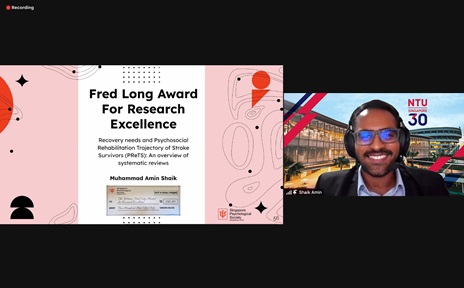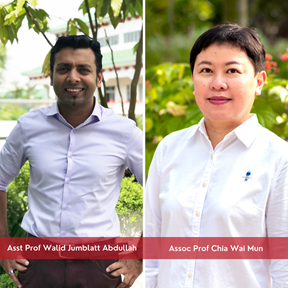Faculty Interview by Graduate Student: Interview with Prof Yohanes Eko Riyanto
1. Can you describe your role at NTU?
I am a Professor in the Economics Program of the School of Social Sciences (SSS). Currently, I am also Associate Dean (Research) of the College of Humanities, Arts and Social Sciences (CoHASS) and also Director of the Center of Liberal Arts and Social Sciences (CLASS).
2. Can you describe your academic journey leading to NTU?
I obtained my Ph.D. in Economics from Katholieke Universiteit Leuven (Catholic University of Leuven), one of Europe’s oldest universities, which will celebrate its 600th anniversary in 2025. I then started my academic career journey with the University of Groningen in the Netherlands and the National University of Singapore (NUS) before joining Nanyang Technological University (NTU) in 2009.
3. What is your motivation for joining NTU?
NTU is one of the most rapidly growing research-intensive universities globally that is consistently ranked high in the various established world top university rankings. Being a young university, it has a tremendous potential to grow further. I was impressed by this. Before joining NTU, I had the opportunity to interact with some of the existing NTU faculty at that time. After visiting NTU on several occasions, I was captivated by its vibrant environment, superb infrastructure and facilities, and great potential for further growth.
4. Can you describe your current research?
My research focuses on Experimental and Behavioral Economics topics. I utilize controlled laboratory experiments to investigate how individuals make a host of economic decisions and how these decisions are influenced by their preferences and beliefs, their environment (market and non-market institutions surrounding them), and their strategic interactions with other individuals. I incorporate insights from microeconomics, game theory, behavioral sciences to formulate testable experimental hypotheses.
Currently, I am working on several research thrusts. The first one is the experimental asset markets and behavioral finance. Within this research thrust, I study market efficiency, asset price dynamics, risk-sharing, and investors’ trading behaviors in simulated financial markets in the laboratory. The second one is applying the market design to allocate organs for transplants from donors to recipients. Specifically, my research focuses on incentivizing people to register as organ donors using different allocation priority rules, incentive mechanisms, salient information, and behavioral nudges. A well-designed priority rule for organ allocation helps moderate organ scarcity by improving allocative efficiency and providing more substantial donation incentives. The third one is the role of social preferences in motivating people’s desire to build social bonds that would enhance cooperation and coordination in a society where individual and collective interests are not necessarily aligned. Within this thrust, I also study topics such as; the dynamics of trust and trustworthiness and how they evolve in social networks, honest and dishonest behaviors, altruistic behaviors in the market and non-market setting, the role of culture, identity, and language in shaping people’s social preferences.
5. What is currently the hot topic in your research field?
There are a few. For example, in the domain of the experimental asset market, the impact of dark pool trading, which is an alternative trading platform where bids and asks orders submitted by traders are not publicly disclosed, on the efficiency of the financial market. In dark pools, the market depth is not visible, and the matching between bids and asks is less transparent, and the price is often determined based on the mid-point price between the best bid and the best ask in the conventional (lit) exchange platform. Whether dark pool trading should be regulated and, if so, what kind of regulations should be enforced has a lot of practical relevance for the working of the financial market. Another example is laboratory experiment investigation of the desirability of various alternative mechanisms to allocate scarce resources, e.g., school choice mechanism to allocate prospective students to schools accounting for students’ school preferences, organ donation allocation, covid19 vaccine allocation, and many others.
6. What do you enjoy doing beyond your research?
I love photography. In my spare time and whenever possible I love to take photos. I also like to explore cuisines, doing culinary escapades visiting hawkers centres with famous stalls, restaurants, eating establishments. Most of all, I like spending time with my family on trips visiting places and holidaying. Sadly, we have not been able to do this in the last 1.5 years because of the pandemic.
Selected publications
- “Best Practices in Replication: A Case Study of Common Information in Coordination Games,” (2021), with Roy Chen and Yan Chen, Experimental Economics, 24, pp. 2-30 (Lead Article).
- “Asset Markets with Insider Trading Disclosure Rule and Reselling Constraint: An Experimental Analysis,” (2020), with Edward Halim, Journal of Economic Dynamics and Control, 110, 103745.
- “Costly Information Acquisition, Social Networks, and Asset Prices: Experimental Evidence,” (2019), with Edward Halim and Nilanjan Roy, Journal of Finance, Vol.74, Issue 4, pp. 1975-2010.
- “Enhancing Effort Supply with Prize-Augmenting Entry Fees: Theory and Experiments,” (2019), with Robert Hammond, Lu Jingfeng, and Liu Bin, International Economic Review, Vol. 60, Issue 3, pp. 1063-1096.
- “Would You Pay for Transparently Useless Advice? A Test of Boundaries of Beliefs in the Folly of Prediction”, (2015), with Nattavudh Powdthavee, Review of Economics and Statistics, Vol. 97, No. 2, 257-272.
/prof-eko78d0158f-7dc1-42fa-940b-c530756032d2.jpg?Status=Master&sfvrsn=b6c08d1_3)

/prof-shannon-ang.tmb-listing.jpg?Culture=en&sfvrsn=3759e161_1)
/asst-prof-luk.tmb-listing.jpg?Culture=en&sfvrsn=ac09b67e_1)
/asst-prof-suzy-styles.tmb-listing.png?Culture=en&sfvrsn=c41e8ebb_1)


c56220bb-a473-4bc7-9bf6-3ca0197a1840.tmb-listing.jpg?Culture=en&sfvrsn=3c9e8feb_1)